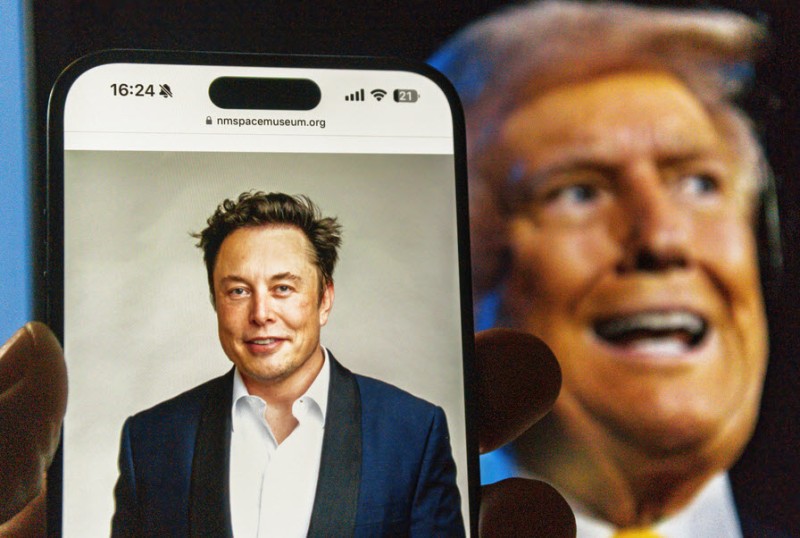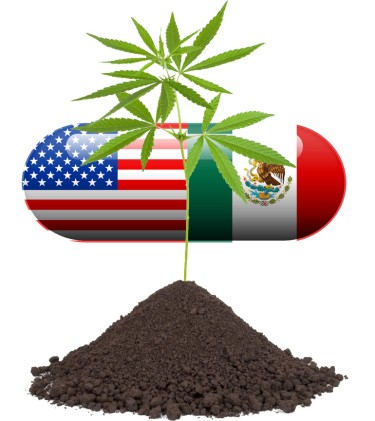
Did Elon Musk's DOGE Budget Cuts Get a Mexican Drug Informant Killed?
A disturbing story has emerged from Mexico that raises serious questions about the real-world consequences of hasty government budget cuts. According to a heartbreaking account posted on Reddit, a Mexican man named Rodrigo Landgrave Fuentes and two of his family members were brutally murdered by cartel members who spray-painted "DEA informant" on the walls of his home after killing them.
What makes this story particularly chilling is the alleged connection to recent budget cuts implemented by the Department of Government Efficiency (DOGE), the new federal cost-cutting initiative headed by billionaire Elon Musk. According to the Reddit post, which appears to be from Rodrigo's cousin, the victim had been secretly working as a DEA informant for years, providing critical intelligence on cartel operations in exchange for payment and protection of his identity.
But that protection apparently evaporated after DOGE's sweeping budget cuts hit the DEA, reportedly resulting in the dismissal of agents responsible for safeguarding sensitive information—including the identities of confidential informants in Mexico. According to the post, Rodrigo's DEA contact had warned him directly: "There's no one who can protect you anymore."
Days later, he was dead.
While I cannot independently verify every detail of this account, the specifics mentioned—including Rodrigo's diving hobby and his ownership of "Spider," a textile architecture company—along with a linked Facebook profile, lend credibility to the story. If accurate, this tragedy raises profound questions about the responsibility of government agencies to those who risk their lives to provide intelligence, and the potential human cost of slash-and-burn approaches to government efficiency.
When Budget Cuts Have Fatal Consequences
Let me be clear: I'm not opposed to government audits or budget reform. In fact, they're long overdue in many areas of bloated federal spending. The war on drugs itself has been an astronomical waste of taxpayer dollars, funneling billions into failed policies that have never come close to achieving their stated goals. As someone who advocates for the full legalization of all drugs for adults, I'd be the first to celebrate smart reductions in punitive drug enforcement budgets.
But there's a difference between strategic reform and reckless demolition. When you make broad, indiscriminate cuts to programs like undercover drug operations without carefully considering the human elements involved, people can die. And in this case, it appears someone did.
Rodrigo wasn't just a line item on a budget spreadsheet. According to his cousin's account, he was "a passionate deep-water diver" and a businessman who ran a company specializing in textile architecture and tensile structures. He was described as "a brave, good man who deserved much more" than to be abandoned by the very government that promised to protect him.
If the allegations are true, this raises serious questions about whether DOGE performed due diligence before implementing these cuts. Did Musk and his efficiency team consider the protection of confidential informants? Did they have a transition plan for maintaining critical security protocols? Or were human lives like Rodrigo's simply considered acceptable collateral damage in the pursuit of a leaner government?
The brutal reality of informant work is that it carries life-or-death stakes. When someone agrees to provide intelligence on drug cartels—organizations notorious for their brutality and vengeance—they do so knowing the extreme risk involved. The only thing making that risk manageable is the promise of protection. Break that promise, and you're potentially signing their death warrant.
A Pattern of Abandonment
Tragically, this wouldn't be the first time the United States government has abandoned those who risked everything to help American interests abroad. The pattern is disturbingly familiar across regions and administrations.
In Afghanistan, thousands of interpreters and other local allies who worked alongside American forces were left behind during the chaotic 2021 withdrawal. Many faced Taliban retribution, with reports of executions and disappearances continuing to emerge. Despite promises of special visas, countless Afghans who risked their lives to support U.S. operations remain in hiding, abandoned by the country they helped.
During the Vietnam War, many Hmong people fought alongside American forces as part of a CIA-backed operation. When the U.S. withdrew in 1975, thousands were left behind to face persecution and genocide at the hands of communist forces. Some eventually made it to America as refugees, but only after years of danger and hardship.
In Iraq, local interpreters and informants who provided critical intelligence during the war and subsequent occupation faced systematic assassination campaigns when U.S. forces withdrew. Many were denied promised visas or faced years-long delays, during which they and their families remained in extreme danger.
The pattern is clear: America often recruits local assets with promises of protection and support, only to abandon them when political priorities shift or budgets get tight. Rodrigo Landgrave Fuentes appears to be the latest victim of this callous practice, with the added twist that his protection wasn't eliminated by a strategic military withdrawal but by a billionaire's budget-cutting exercise.
The Failed War on Drugs: A Bigger Picture
This tragedy highlights a fundamental problem with American drug policy. For decades, the U.S. has attempted to address its domestic drug issues by funding enforcement operations in source countries—a strategy that has failed spectacularly while causing immense collateral damage.
If DOGE were truly focused on government efficiency, it would recognize that the entire framework of drug prohibition is perhaps the most wasteful government program in American history. Since President Nixon declared the "War on Drugs" in 1971, the United States has spent over $1 trillion on drug enforcement efforts. The result? Drugs are more available, more potent, and in many cases cheaper than they were 50 years ago.
Meanwhile, prohibition has fueled the rise of violent cartels, corrupted governments, militarized police forces, and filled American prisons with non-violent offenders. It has devastated communities of color through discriminatory enforcement and created a massive underground economy that operates outside the law.
The truly efficient approach would be to legalize and regulate all drugs for adult use. This would eliminate the black market, generate tax revenue, reduce violence, allow for quality control, and enable a public health approach to addiction. Countries that have moved in this direction, like Portugal (which decriminalized all drugs in 2001), have seen reductions in problematic drug use, HIV infections, and drug-related crime.
But instead of this systemic reform, DOGE appears to have simply slashed budgets for existing programs—including, allegedly, those protecting the identities of informants working against cartels trafficking fentanyl and other drugs into the U.S. This is neither efficient nor humane; it's dangerous half-measures that maintain the failed prohibitionist framework while removing what limited protections existed within it.
Billionaire Decision-Making and Real-World Consequences
This case also raises questions about the wisdom of putting billionaires with limited government experience in charge of sweeping federal reforms. Elon Musk has demonstrated remarkable innovation in certain fields, but his understanding of complex government operations—particularly those involving human intelligence networks and international security—appears questionable at best.
There's a certain technocratic hubris in believing that complex government functions can be optimized the way one might streamline a manufacturing process or coding project. Government agencies, particularly those dealing with national security and international operations, involve intricate human relationships and delicate balances of trust that can't be reduced to simple metrics of efficiency.
This doesn't mean these agencies should be immune from reform or budget scrutiny. Far from it—many government operations could benefit from thoughtful reorganization. But that reorganization needs to be conducted with a comprehensive understanding of the human stakes involved, not just the financial ones.
If Rodrigo's death is indeed linked to DOGE's budget cuts, then Musk's hands are not clean in this matter. When you take on responsibility for government operations that involve human lives, you bear moral responsibility for the consequences of your decisions. Budget lines representing witness protection programs aren't abstract concepts—they represent real people whose lives depend on those resources.
The Sticky Bottom Line
There is no happy ending to this story. Rodrigo Landgrave Fuentes is dead, along with two family members, allegedly because budget cuts eliminated the protections he was promised in exchange for his cooperation. His family is shattered, and his blood stains the ledger of American drug policy.
The bitter irony is that this tragedy occurred under the watch of an efficiency program that has failed to address the most inefficient aspect of American drug policy: prohibition itself. If DOGE were truly interested in government efficiency, it would be advocating for comprehensive drug policy reform that would eliminate the need for dangerous informant operations in the first place.
Instead, it appears to have simply cut budgets without concern for the human consequences—a move that is neither efficient nor moral. It's a brutal reminder that when powerful people make decisions from comfortable offices, they often fail to consider the life-or-death impact those decisions might have on individuals thousands of miles away.
For those making these decisions—including Elon Musk—this should be a moment of serious reflection. Government is not a business. Budget lines represent human services, human protections, and sometimes human lives. Cutting them requires careful consideration of the consequences, not just celebration of the savings.
As for drug policy reform, this tragedy only underscores the urgency of moving toward a system of legalization and regulation. The current approach not only fails to prevent drug use or trafficking, but it creates a violent black market that claims countless lives—including, it seems, those who try to help the U.S. government fight it.
Rodrigo deserved better. His family deserved better. And American taxpayers deserve a more thoughtful, humane approach to both government efficiency and drug policy than what we're currently seeing.
The blood of Rodrigo Landgrave Fuentes demands accountability—not just from the cartel members who pulled the trigger, but from those whose decisions may have made it possible. That includes everyone involved in implementing these cuts without ensuring the safety of those who risked everything to help the United States government.






